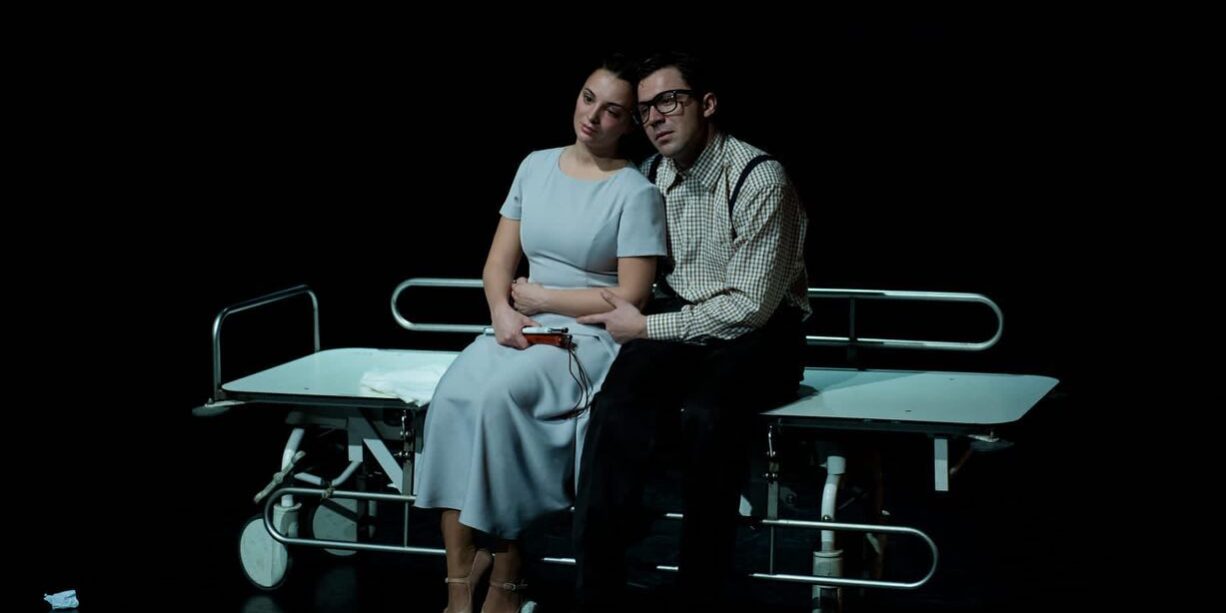National Theatre of Kosovo, premiere 7th December 2022
During December, International Month of Persons with Disabilities, the amphitheatre of the Palace of Youth, the temporary home of the National Theatre of Kosovo, premiered Molly, an Albanian adaptation of the 1994 play Molly Sweeney by Irish writer Brian Friel about a woman with a visual impairment who regains her sight.
As a heartbeat monitor beeps sharply, Molly (Verona Koxha) sits on a hospital bed. Dim streaks of light drift in the background. The remnants of Molly’s vision. Cautiously she unfolds a cane. There is a hopeful passion in her voice, despite the hand fate has dealt her. Meanwhile her husband Frank (Bujar Ahmeti) talks with great excitement about his newest venture, and for a moment he seems more preoccupied with his work than with his family. Although he dotes on Molly, his insistence that she go through dangerous surgery to restore her eyesight suggests the kind of passive-aggressive resolve that can go too far.
The past glories of Dr Rice (Afrim Muçaj), the play’s third character, are behind him and he needs a great medical triumph in order to be reinstated. So when Frank asks him to help restore Molly’s vision, he sees a glimpse of hope, despite the low odds of success. Molly has nothing to lose, the men agree on her behalf. Frank is adamant that restoring her vision will make Molly complete. “You have to see, you have to see!” he keeps saying. Retinitis pigmentosa is the diagnosis both men confidently throw around, like a ball in a court. Every now and then, the bed on which Molly sits is pushed and shoved around the stage, which evokes the haphazard manner in which people with disabilities are often treated by institutions charged with their care.
Then, as Frank is reminiscing about his and Molly’s courtship, Ahmeti breaks out of character and asks the audience: “Did you ever do anything for the blind? Did you ever invite a blind person to go on a walk with you?” It is a reminder of the human duty towards people with disabilities, and a call to action. It’s a reminder of the deeply human need to connect with one’s fellow woman and man, and the simplicity of support we can offer one another, disabled or otherwise: a walk in the park, conversation, closeness.
Later, the stage goes completely dark. First it seems simply like a transition between one scene and the next but then, after some time, it becomes clear that this descent into silent darkness is intentional, giving the audience a taste of what it’s like to not be able to see.
Post-surgery Molly describes “a white light that hurts,” to the amazement of Dr Rice, who proudly announces that his intervention was a success. After the initial excitement of regaining her vision, Molly begins to find the world confusing, intriguing but also alarming. Regaining her vision seems to have ruined her imaginary world. “What did you expect, Miss Molly?” the doctor asks, proceeding to explain how learning to see is like learning a new language.
Gradually her restored vision begins to fail, and Molly descends back into her imaginary world. Abandoned in an asylum, she turns numb in body and soul. Her husband and doctor wrap gauze blindfolds around their eyes – the gauze that we saw Molly remove at the beginning of the play. The two men in her life are deliberately blinding themselves because of the pain they caused her. “I failed you!” the doctor says, while the husband utters no sound.

Molly at National Theatre of Kosovo
As Molly, Verona Koxha gives a striking performance underlined with profound sadness. Her unflinching stare and trembling voice feel all too real. Despite being the youngest in the cast, Koxha has considerable presence and gave a similarly memorable performance in The Handke Project, which premiered to acclaim this summer.
Ahmeti is outstanding in the role of Frank, a man who wants to shape his life and his wife in equal measure. The character has a borderline quality about him, shifting between past memories of his sweet courtship with Molly and someone more intimidating in tone in the present. Ahmeti has had a good year – he was also strong in the extraordinary Father and Father winning him best actor at Etno Fest.
Afrim Muçaj capably conveys a man whose desire to restore his professional reputation trumps his Hippocratic oath of putting his patient’s safety above all. An experienced stage and screen actor Muçaj knows that connecting with the audience is key, and he does this well. The moment when he realises he is the cause of Molly’s derailed state of mind is heart-breaking.
This is director Sibel Abdiu’s first collaboration with the National Theatre of Kosovo on a play of this scale. The interventions – the use of darkness and Ahmeti’s out-of-character moment – have a powerful effect. They make the situation more relatable by involving the audience unapologetically, while also being a slap in the face of relevant institutions whose job it is to provide support systems for people with disabilities.
That said, there are a few instances when the performance seems slightly under-rehearsed. This may be due to the responsibility of telling the story right and trying to make it relatable and emotionally resonant, but sometimes things were not as tight as they might be. The looming lack of a happy ending perhaps sets the tone from the beginning.
Theatre is a cultural apparatus that incorporates a wide range of tools to convey a message, and in this instance it went full throttle, making a clear and furious statement. The situation for blind people and disabled people in Kosovo is in dire need of improvement. Molly also premiered during the campaign “16 days of activism against gender-based violence”, which took place between 25th November until 10th December. What happens to Molly is yet another form of violence which needs to be fully acknowledged and properly addressed.
Written by: Brian Friel // Directed by: Sibel Abdiu // With: Verona Koxha, Afrim Muçaj, Bujar Ahmeti // Visuals: Lulzim Luigji Bejta // Composer: Albin Sopa
Further reading: review of Club Albania at National Theatre of Kosovo
Bora Shpuza is a literary translator and freelance art reviewer based in Prishtina,








